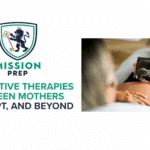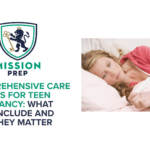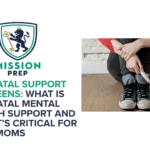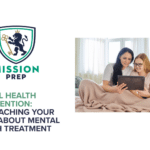Mindfulness and Trauma Therapy for Teen Parents

Becoming a parent can be one of life’s richest, most valuable experiences. But let’s face it: It can also bring stress, uncertainty, and emotional upheaval – especially if you’re a teen parent.
Teen moms and dads are still navigating their own lives. The adolescent years come with so many pressures already; studying to ace finals and get into a preferred college, maintaining your social lives and relationships, and commitments to sports or hobbies. The list could go on.
And while some teens have the support of their families around them, this isn’t the case for some. Financial difficulties, strained relationships, and a history of trauma – all of these can add to the already overwhelming experience of being a teen parent.
Evidently, being a young parent can be hard, and quite often, these pressures can take a toll on a teen’s mental health. Unfortunately, with all of the thoughts centered around the baby, it’s easy for thoughts on self-care to take a backseat. Yet, self-care is important, now more than ever.
The good news is that teen moms and dads don’t have to go it alone. Support is out there, and the team at Mission Prep is here to help. This article also works as a useful guide, exploring:
- Trauma therapy
- Mindfulness as a tool for teen parents
- Practical techniques for mindfulness
- Stress relief for teen parents
- Developing emotional resilience
- Parenting support
- How Mission Prep can help

Trauma Therapy: Understanding the Roots and Consequences
Loneliness and Low Mood
Due to parenting commitments, teen parents may not be able to attend parties and social events like their non-parenting friends can. It can be harder to maintain these connections too, so it’s not uncommon for teen moms and dads to feel lonely and more isolated. It’s also important not to rule out the stress that teen moms go through during the pregnancy process and childbirth.
Without the proper care and support, the trauma experienced can lead to irritability, low mood, or anxiety – symptoms that make daily parenting tasks even more difficult.2
Access to Mental Healthcare
Young moms and dads can often face barriers when accessing mental healthcare, too. Not being able to afford treatment is common, often due to the financial pressures of having a child. There are also other things to consider, like lack of transportation and accessibility to the right resources where they live.
However, getting the support you need is vital. Without support, your mental health can worsen, and this can affect not only you but your loved ones and baby, too. There is a need for early, trauma informed support for teen dads and moms to navigate these challenges and build healthier futures. This is where trauma therapy can help.
Aside from these communication skills, coparenting for teen parent resources can also help create a greater sense of stability through the following techniques.
Trauma Therapy for Teen Parents
Trauma therapy aims to address the underlying wounds that can lead to mental health struggles for teen parents. Consider young people who may have experienced abuse in their own childhood and how they may be triggered by the stress of parenting themselves. Or, someone who has experienced violence and as a result may struggle with anger or withdrawal, affecting their ability to bond well with their child or provide stable care.
By providing a safe space for teen moms and dads to explore these feelings, trauma therapy allows them to make sense of these experiences. As a result, young parents can learn valuable coping mechanisms to prevent their trauma from taking over their lives, and prevent trauma from being passed down through the generations.3
Common trauma therapy approaches include:
Trauma-Focused Cognitive Behavioral Therapy (TF-CBT)
This therapy is tailored towards children and adolescents who carry the weight of negative past experiences. TF-CBT will typically involve a teen’s parent or caregiver to help them address and process these events.
This approach is known to be effective for young people suffering from post-traumatic stress disorder (PTSD), with the end goal of developing healthy coping strategies to minimize the impact of trauma on their daily lives.
Eye Movement Desensitization and Reprocessing (EMDR)
EMDR involves recalling traumatic events while doing specific eye movements, or other forms of stimulation such as tapping or listening to sounds. A clinician will be on hand to guide you through this process, so you’ll be safe and supported the whole time. EMDR is recognized as an effective treatment for teen PTSD treatment.4
Mindfulness-Based Cognitive Therapy (MBCT)
This is a form of cognitive behavioral therapy – it offers ways to organize and process thoughts in a healthy, manageable way that minimizes stress and low mood. MBCT introduces a focus on mindfulness – along with the principles of CBT.
Mindfulness encourages engagement in the present moment, which can be achieved through techniques like ‘body scanning’ and meditation. We’ll chat more about mindfulness, and how to integrate it into your daily life, soon.
These therapies can help young moms and dads reframe traumatic memories and are a valuable asset in teen trauma recovery techniques. As a result, emotional distress can be minimized, and young parents can heal. Trauma therapy can help empower teens to reclaim control over their mental health and their journey as parents.5
Mindfulness: A Powerful Tool for Teen Parents
Mindfulness can be defined as giving attention to the present moment in a way that is non-judgmental and focused. It’s a great way to prevent the cycle of repeatedly dwelling on negative thoughts and feelings and worry that often comes with trauma and depression.
Mindfulness can also help young parents become more aware of their own thought processes and emotions – without becoming overwhelmed, which allows for a calm, more grounded response to challenges in daily life. Research has shown that mindfulness also reduces symptoms of depression and anxiety, improves emotional regulation, and nurtures resilience, especially in populations that tend to experience high levels of stress, such as teen parents.6
What’s more, mindfulness can support teen moms and dads in strengthening their parent-child bond. Mindful parenting encourages moms and dads to be present and empathetic, which results in more positive parenting experiences. It’s even been shown in studies that programs which combine yoga, meditation, and mindfulness education can lead to lower levels of parental stress and improvements in mood.7
So, there are many benefits of integrating mindfulness into your daily life as a teen parent. But how can you do so in a way that doesn’t take you away from your parenting duties? Let’s explore some straightforward ways to practice mindfulness.
Mindfulness for Teen Parents: Practical Techniques
Bringing mindfulness into the lives of teen moms and dads doesn’t have to be difficult. It can be easily accessible and effective. Here are some evidence-based techniques that are uncomplicated, and can be invaluable when considering self-care strategies for teen parents.
1. Breath Awareness
Paying attention to your breathing calms the nervous system. That’s why in moments of heightened stress you may hear the phrase ‘breathe in, breathe out’ as a form of gentle encouragement to help the distressed individual become more relaxed.
A parent might feel frustration if, for example, their child throws a tantrum. ‘Mindful breathing’ as it’s called, even in brief moments such as taking ‘five deep breaths’ before reacting to their child, can reduce the level of stress hormones in the body (which eases stress) and help young parents remain grounded and less reactive.
2. Body Scans
This practice involves taking a moment to be present, and mentally ‘scanning’ your body. To feel any sources of tension or discomfort, you can consciously relax those areas and release that stress – that’s what body scans are all about.
3. Mindful Journaling
Writing about emotions and experiences helps people ‘take stock’ and process their life events in healthier, more controlled ways. Journaling can be as extensive as you like, or short and sweet.
It’s meant to alleviate stress, so it’s best to keep it simple. It can be a little five-minute activity before going to bed – and with enough consistency, can become a habit that reaps many benefits for young parents and their young children.
4. Mindful Movement
Exercise is a well-established way to regulate your mood, but it doesn’t always have to be a long jog or a gym session. Mindful movement focuses on more gentle ways of moving that allow you to think things through and process your emotions – walking, yoga, or a light swim, for example.
5. Guided Meditation
This is particularly good for teen parents who aren’t experienced in practicing meditation themselves. Guided meditative therapy for teen parents involves gentle, encouraging prompts to aid focus and relaxation. This can be done in person, but there is increasing availability of audiobooks, podcasts, and apps that can all be useful, too.
Studies have shown that encouraging teen moms and dads to build even a few minutes of mindfulness into their daily routine can lead to ongoing stress relief and a build-up of emotional resilience over time.8
When young parents feel supported and equipped to handle stress, they are better able to provide nurturing care to their children and model healthy coping for future generations.9 So, it’s certainly worth investing the time in.
Emotional Resilience for Young Mothers and Fathers
Emotional resilience describes the ability someone has to adapt and recover from stressful events. So, you can imagine how essential a skill this is for a young mom or dad navigating the unique challenges of parenting at an age where they already face many other difficulties.
Mindfulness and trauma informed therapy can be a useful solution when paired together – they both improve emotional resilience by giving the person an opportunity to take a moment, consider their own thought patterns in a non-judgmental way, and as a result, be less reactive or overwhelmed.
Resilient, ‘cool and calm’ moms and dads are more likely to have positive interactions and relationships with their kids. This positive mindset also works against the effects of future stress and trauma, which in turn promotes long-term family stability.
Programs that focus on emotional resilience – that teach young parents to identify triggers and be more compassionate with themselves – are shown to play a vital role in reducing isolation and providing practical parenting support.10
Parenting Support: Helping Teen Moms and Dads Thrive
Beyond trauma therapy and mindfulness, parenting support is crucial for young moms and dads to succeed in their journey. This can include education about child development, practical skills for caregiving, and assistance with navigating healthcare, education, and social services.
Fortunately, the experienced team at Mission Prep has a comprehensive support program tailored to young parents. If you or a loved one is a teen who’s just got the news they’re going to be a mom or dad – or indeed, is in the early stages of parenting and needs more support with their mental health – then look no further.

Mission Prep: Supporting Teen Parent Mental Health
While parenting as a teenager can feel like an uphill battle filled with uncertainty and pressure, the resources available for teen moms and dads are increasing – and so is the support available. This support importantly acknowledges teen parents’ struggles and empowers them to succeed.
This is where Mission Prep can come in. Our team specializes in adolescent care, offering services that can be particularly beneficial in providing emotional support for teen parents.
We offer a range of treatment packages for conditions relating to teenage parents mental health, such as:
- Residential Treatment: 24/7 care in state-licensed homes with a 3:1 staff-to-client ratio
- Outpatient Programs: Flexible treatment plans that allow teens to live at home while receiving care
- Telehealth Services: Virtual therapy sessions for those unable to attend in person.
These options provide flexibility for young parents to balance work, parenting, and other responsibilities. We also offer a wealth of online resources to support your journey as a teen parent. Check out our pages on:
If you or someone you know is a young mom or dad struggling with their mental health, reach out to our team today. With the right guidance and care, teenage parents can build bright, healthy futures for themselves and their children.
References
- Vibhakar, V., Allen, L. R., Gee, B., & Meiser-Stedman, R. (2019). A systematic review and meta-analysis on the prevalence of depression in children and adolescents after exposure to trauma. Journal of Affective Disorders, 255, 77–89. https://doi.org/10.1016/j.jad.2019.05.005
- Sibinga, E. M. S., Perry-Parrish, C., Thorpe, K., Mika, M., & Ellen, J. M. (2014). A small randomized controlled trial of mindfulness-based stress reduction for youth experiencing elevated stress. The Journal of Alternative and Complementary Medicine, 20(2), 102–109.
- Cohen, J. A., Mannarino, A. P., & Deblinger, E. (2017). Treating trauma and traumatic grief in children and adolescents (2nd ed.). Guilford Press.
- EDMR Rentinck, E. M., van Mourik, R., de Jongh, A., & Matthijssen, S. J. M. A. (2025). Effectiveness of an intensive outpatient treatment programme combining prolonged exposure and EMDR therapy for adolescents and young adults with PTSD in a naturalistic setting. European Journal of Psychotraumatology, 16(1), Article 2451478. https://doi.org/10.1080/20008066.2025.2451478
- National Child Traumatic Stress Network. (2021). Complex trauma in adolescents. Retrieved from https://www.nctsn.org/what-is-child-trauma/trauma-types/complex-trauma/effects
- Bögels,S., & Restifo, K. (2014). Mindful parenting: A guide for mental health practitioners. Springer.
- Kabat-Zinn, J. (2013). Full catastrophe living: Using the wisdom of your body and mind to face stress, pain, and illness(Revised ed.). Bantam Books.
- Sibinga, E. M. S., Perry-Parrish, C., Thorpe, K., Mika, M., & Ellen, J. M. (2014).
- Goodman, S. H., & Garber, J. (2017). Evidence-based interventions for depressed mothers and their young children. Child Development, 88(2), 368–377.
- Siegel, D. J., & Bryson, T. P. (2018). The yes brain: How to cultivate courage, curiosity, and resilience in your child. Bantam



















